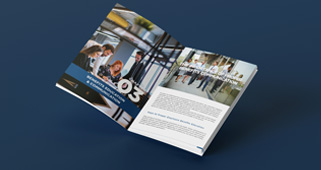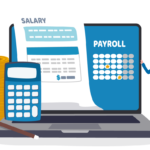As technology continues to advance at an unprecedented pace, industries across the globe are experiencing significant transformations, and human resources (HR) is no exception. With the emergence of Artificial Intelligence (AI), HR practices are undergoing a revolution, promising to streamline operations, enhance decision-making, and ultimately redefine the role of HR professionals. In this comprehensive blog post, we’ll explore the profound impact of AI on HR functions and the implications it holds for the future of work.
Understanding AI in HR:
Before delving into the implications, it’s essential to grasp the concept of AI in the context of HR. AI refers to the simulation of human intelligence in machines, enabling them to perform tasks that typically require human intervention. In HR, AI is utilized in various forms, including machine learning algorithms, natural language processing (NLP), chatbots, and predictive analytics, among others. These AI-powered tools have the capability to automate mundane tasks, analyze vast amounts of data, and provide valuable insights to HR professionals, thereby revolutionizing traditional HR practices.
AI and Recruitment:
Recruitment is one of the most critical functions of HR, and AI is transforming the way organizations identify, attract, and hire talent. AI-powered recruitment platforms leverage data analytics and machine learning algorithms to sift through resumes, identify qualified candidates, and predict candidate success based on historical data. These platforms not only expedite the hiring process but also help mitigate bias by focusing on candidate qualifications rather than subjective criteria.
Furthermore, AI chatbots are increasingly being used to engage with candidates, answer inquiries, and schedule interviews, providing a seamless and efficient candidate experience. With AI’s ability to analyze candidate behavior and preferences, organizations can personalize their recruitment strategies, thereby enhancing candidate engagement and improving overall recruitment outcomes.
AI and Employee Experience:
Employee experience has emerged as a critical factor in organizational success, and AI is playing a pivotal role in shaping and enhancing it. AI-powered HR platforms utilize predictive analytics to anticipate employee needs, preferences, and behaviors, allowing organizations to proactively address issues such as employee turnover, engagement, and performance.
Additionally, AI chatbots are revolutionizing employee support functions by providing instant assistance with HR-related inquiries, such as benefits enrollment, policy queries, and training information. By automating routine tasks and providing timely support, AI-powered chatbots not only enhance employee satisfaction but also free up HR professionals to focus on strategic initiatives.
AI and Learning & Development:
Continuous learning and development are essential for employee growth and organizational success, and AI is revolutionizing the way organizations deliver training and development programs. AI-powered learning platforms utilize personalized algorithms to recommend relevant courses, modules, and resources based on individual employee profiles, skills gaps, and career aspirations.
Moreover, AI-enabled assessment tools are transforming the way organizations evaluate employee skills and competencies. By analyzing employee performance data and providing real-time feedback, these tools enable organizations to identify skill gaps, tailor learning interventions, and track employee progress more effectively.
AI and Performance Management:
Traditional performance management practices are often criticized for their lack of effectiveness and objectivity. However, AI is poised to revolutionize performance management by introducing data-driven and continuous feedback mechanisms. AI-powered performance management platforms utilize predictive analytics to assess employee performance, identify patterns, and predict future outcomes.
Furthermore, AI algorithms can analyze various data sources, including employee feedback, project outcomes, and peer reviews, to provide holistic insights into employee performance. By leveraging AI, organizations can facilitate more meaningful performance conversations, identify development opportunities, and foster a culture of continuous improvement.
AI and Workforce Planning:
Effective workforce planning is critical for organizational agility and competitiveness, and AI is revolutionizing the way organizations anticipate and plan for future workforce needs. AI-powered workforce planning tools leverage predictive analytics to forecast labor demand, identify talent gaps, and optimize workforce allocation.
Moreover, AI algorithms can analyze external factors such as market trends, economic indicators, and demographic shifts to provide organizations with valuable insights into future talent requirements. By harnessing the power of AI, organizations can make more informed decisions about recruitment, retention, and talent development, thereby ensuring they have the right people in the right roles at the right time.
Challenges and Considerations:
While the potential benefits of AI in HR are vast, organizations must also be mindful of the challenges and considerations associated with its implementation. Chief among these are concerns around data privacy, security, and ethical implications. As AI relies heavily on data, organizations must ensure they have robust data governance frameworks in place to protect employee data and mitigate the risk of bias or discrimination.
Additionally, the widespread adoption of AI in HR may necessitate reskilling and upskilling HR professionals to effectively leverage AI-powered tools and platforms. Furthermore, organizations must be cognizant of the potential impact of AI on workforce dynamics, including job displacement and the need for new roles and skill sets.
In conclusion, AI is poised to revolutionize the field of HR, transforming traditional practices and reshaping the future of work. From recruitment and employee experience to learning & development and performance management, AI-powered tools and platforms offer unprecedented opportunities to enhance efficiency, effectiveness, and employee engagement.
However, realizing the full potential of AI in HR requires careful consideration of the associated challenges and considerations, including data privacy, security, and ethical implications. By addressing these challenges and leveraging AI responsibly, organizations can unlock the full potential of AI to drive organizational success and create a future-ready workforce.
As we navigate the evolving landscape of HR in the digital age, one thing is clear: the future belongs to those who embrace the transformative power of AI and harness it to create a more agile, inclusive, and resilient workforce.






